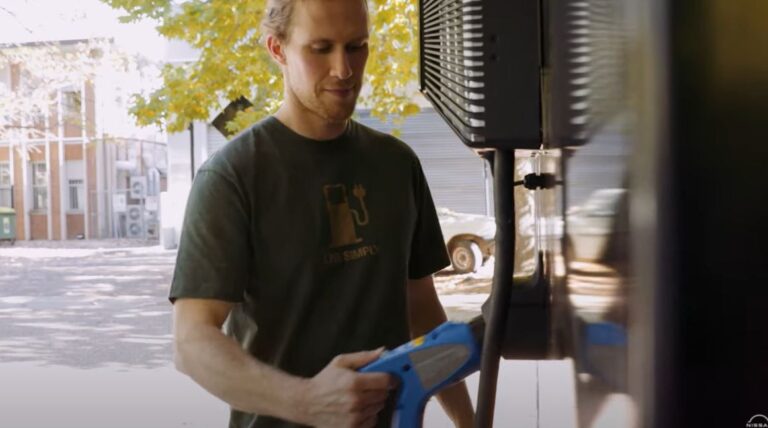
10 October 2022
Dr Bjorn Sturmberg, Research Leader with the Battery Storage and Grid Integration Program is one of four outstanding early career researchers from The Australian National University (ANU) to be recognised with an ACT Young Tall Poppy Science Award.
Dr Kiara Bruggeman, Dr Joshua Chu-Tan, Dr Bjorn Sturmberg and Dr Amy Dawel have been honoured for pushing scientific boundaries and fostering an appreciation for the sciences by communicating their work to the public.
The awards are considered an early indicator of Australia’s future scientific leaders. They highlight the excellent work of young scientists who have made significant contributions to their respective fields of science that will benefit Australia and the world.
Dr Bruggeman is researching new treatments for people who have suffered a stroke. She uses nanotechnology to engineer biomaterials that support the body and cells’ ability to grow. When stem cells are given the specific physical support and biological cues, they can be directed to become new cells to help the body recover from injury or disease.
“Stem cells have the potential to become any kind of cell, but they’re like teenagers. While they’re full of potential, they’re also lazy. To make stem cells to do something specific, I draw on chemistry, biology, and physics to design materials that can unlock the full potential of these cells,” Dr Bruggeman said.
“Although I’m working on brain tissue and stroke specifically, the principles of my work can be applied to many other diseases and conditions, and so what I learn about designing materials and how they interact with stem cells might even end up helping other researchers looking into heart or bone conditions.”
As a self-proclaimed “mad scientist”, Dr Bruggeman relishes the opportunity to spark curiosity in the sciences and hopes to encourage more people, especially women, to take up a career in STEM.
“I hope to contribute to more thinking and more questioning. There is a lot of science, and it would be unreasonable to expect that we could ever have enough science communication happening for all of the general public to be informed on all current science topics,” Dr Bruggeman said.
Dr Joshua Chu-Tan is a vision scientist who is looking into whether we can harness the molecular messages sent around our body when we exercise as a potential therapy to treat age-related macular degeneration (AMD) and other neurodegenerative disorders such as Alzheimer’s and Parkinson’s disease.
AMD is the leading cause of blindness in the developed world and affects one-in-seven Australians and New Zealanders over the age of 50.
A frequent and passionate science communicator, Josh is a past recipient of the ABC TOP 5 Science media residencies and has given a TEDx talk discussing the unique approaches of scientists in the hunt for new AMD treatments.
In an age where separating the fact from the fiction has never been more important, Dr Chu-Tan said scientists have a responsibility to engage with the general public and set the record straight by actively stepping outside of the confines of the laboratory.
“One of the most important lessons that we should learn from the COVID-19 pandemic is the importance of accurate communication of information, or more specifically, the dangers of misinformation,” he said.
“As scientists, it’s our duty to ensure that the public is well-informed and the next generation of scientists can be inspired to continue asking questions and creating knowledge.”
Dr Bjorn Sturmberg is passionate about helping people achieve zero carbon emissions in their daily lives. His work combines engineering studies with social research to shape the way clean energy technologies such as solar power, batteries and electric vehicles integrate into the electricity grid and our everyday lives.
Clean energy systems are critical to tackling climate change by reducing the world’s carbon emissions. But charging these billions of renewable energy powered homes, vehicles and industries creates challenges for the electricity grid, and this is something Dr Sturmberg is working to address.
He said it’s an honour to play such a crucial role informing the headlines and shaping agendas when it comes to communicating the facts around climate change.
“I believe that society-wide issues such as climate change can only be addressed when all members of society support, and participate in, the required changes,” Dr Sturmberg said.
“Playing a role in shaping an inclusive and engaging conversation around these issues, based on the established facts and latest research outlooks, is fulfilling and a privilege.”
For psychologist Dr Amy Dawel, who seeks to understand how people experience and express emotions, the most rewarding part about communicating her work to the public is seeing first-hand how people put science into action to improve their emotional wellbeing.
“I am passionate about helping people embrace the full rainbow of their emotions. All our emotions tell us something important, so ignoring the ones we don’t like can be an obstacle to living well,” Dr Dawel said.
Dr Dawel said science communication is integral to keeping the public well-informed and should be a priority for all scientists.
“People’s information diet is important for emotional health, just as their food diet is important for physical health,” Dr Dawel said.
“Good scientific evidence and expert advice are critical ingredients for a healthy information diet. We all have a responsibility to make sure these ingredients are widely available.”
The ANU recipients join a cohort of more than 50 ACT scientists who have been honoured since the award scheme’s inception in 2002.
Learn more about the Tall Poppy Awards at the Australian Institute of Policy and Science website.
This story has been adapted from an article that originally appeared on the ANU website.
